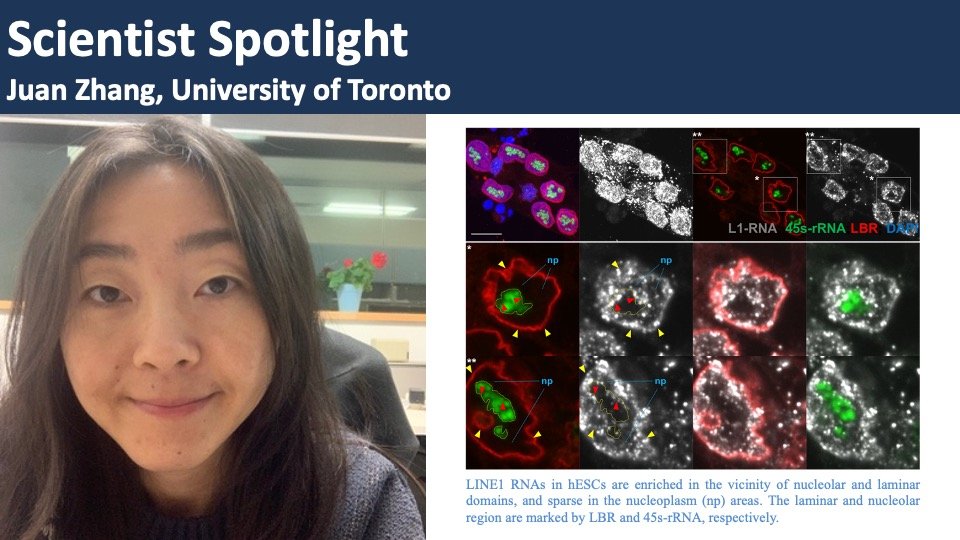Juan Zhang received her PhD from the Humboldt-Universität zu Berlin after carrying out the thesis work at the Max Delbrück Center for Molecular Medicine in Berlin, Germany. She is interested in repetitive elements for their potential roles in chromatin organization during early embryonic development. Juan is currently a Postdoctoral Scholar in the laboratory of Miguel Ramalho-Santos at the University of Toronto.
Can you tell us more about your research?
Understanding early human embryo development is of fundamental interest. We are particularly interested in the 8-cell (8C) state, the stage at which zygotic genome activation occurs, yet the underneath mechanisms are largely unknown. Our study unveiled an important developmental regulatory role of transposable elements (TEs), which is traditionally viewed as a mutagenic selfish element. We found that long interspersed nuclear element 1 (LINE1), the largest mammalian TEs family, is essential for self-renewal and identity of human embryonic stem cells (hESCs), by preventing reversion to the 8C-like cells (8CLCs) state. The 8C repressor role of LINE1 is partially dependent on TPRX1, a pioneer factor that activates zygotic genes in early 8C state. Combining sequencing and fluorescence in situ hybridization (FISH) strategies, we found that LINE1 RNA in hESCs is preferentially localized to the lamina and periphery of the nucleolus, which are typical gene-repressing heterochromatic domains in the nucleus. Further data integration suggests a role for nucleolar dynamics in the 8CLC-hESC transition. In agreement, independent perturbations of the nucleolus induce the 8C program in hESCs. Moreover, LINE1 knockdown leads to nucleolar stress signatures, indicating its requirement for nucleolar architecture organization. Overall, our study reveals that LINE1 coordinates nuclear compartmentalization and chromatin-mediated gene repression to prevent developmental reversion of hESCs.
Where are you from? What do you miss about your hometown/country?
I am from China. Of course, I miss my family most there.
What city do you currently live in and what do you like most about this city?
I live in Toronto now. Comparing to other cities I have been, Toronto has a big variety of Asian restaurants and shops, which provides a lot convenience.
What are some ways you detach from work/science/academia? Do you have a favourite example of this?
My lifestyle has adapted to a simple mode in Toronto. Nevertheless, I still keep the hobby of house planting. I maintain quite many pot plants at the lab windows, of course at home too. In the past two-three years, reading has been an important habit that benefits me a lot. I also enjoy sometimes a city-walk with friends after the work.
Do you have any special talents outside of research that few people in your academic life know about?
I think cooking would be the talent, though all my colleagues and friends are aware of it so not few people know about it.
Do you have a recommendation for a book, tv show, movie or documentary?
One of my top recommendation books is the never ending story by Michael Ende. The second part of the story, not the first part that was filmed in movie, inspires me a lot. I would also like to recommend The Book of Life: Daily Meditations with Krishnamurti. It is a very handy book to smooth my emotions.
What made you decide to become a researcher?
I decide to become a researcher because I had the curiosity to biology, was able to ask questions, and excited to bring up hypothesis. Thinking back, my grandfather when I was kid and a biology teacher at high school had very positive feedbacks to my naïve curiosity, which might be the original source of confidence for me to strive in this field.
If you wouldn’t be a researcher, what would you like to be/think you would be?
I think I would like to be a potter, if not be a researcher. I like art crafts, especially pots. It must be cool to make diversity styles of pretty pots myself.
What sparked your interest in epigenetics?
I am interested in solving the mystery of embryo development. As we know, epigenetics plays indispensable and fine-tuned regulatory roles. Its dysregulation leads to diseases like cancer and aging.
If you could give your “first-year-PhD-self” one advice, what would it be?
Think beyond the one “exciting” PhD project, open the view to longer-term career path and improve communication skills.
Where would you like to see your research/field of interest end up in the future?
I think/hope our research field will ultimately decode the human genome – proteins, noncoding genes, repetitive elements and so on, and how these “note” elements compose into the symphony score of life.

